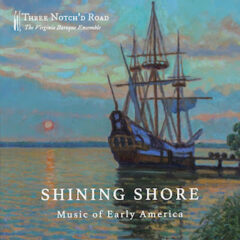
Three Notch’d Road: The Virginia Baroque Ensemble: exploring its own Virginia heritage in music from the 17th to the 19th centuries that might have been heard in Virginia
By Robert Hugill
 Shining Shore: The Music of Early America
Shining Shore: The Music of Early America
Three Notch’d Road: The Virginia Baroque Ensemble
Available at the group’s website
http://www.tnrbaroque.org/recordings/#shining-shore
This lovely disc takes you to a world that is at once strange yet familiar. Three Notch’d Road: The Virginia Baroque Ensemble, performs the music of early America on Shining Shore. The disc features Steuart Pincombe (baroque cello), Michelle Pincombe (soprano), Peter Walker (vocalist, English guitar, cittern, Appalachian dulcimer, harp), Dominic Giardino (historical clarinet) and Fiona Hughes (artistic director, baroque violin, alto, harp) in music by Purcell, Handel, Jeremiah Ingalls, Thomas Baltzar, T. Ravenscroft, A Davisson, Oliver Shaw, Charles Thomas Carter, William Walker, and George Frederic Root. Some will be familiar names, but many will not.
Named for a colonial route through central Virginia, Three Notch’d Road: The Virginia Baroque Ensemble specializes in the performance of historical repertoires from both sides of the Atlantic. Shining Shore explores the group’s own Virginia heritage, presenting music from the 17th to the 19th centuries that would have been heard in Virginia. In the booklet note they say that their purpose in making this recording was “to open to the listener beauties of a time and place far from our own, both strange and strangely familiar.” And of course, making the disc in 2020 (recorded December 16-19, 2020 at Sono Luminus Studios, Boyce, VA) meant that “these songs’ texts about mortality and hope held a deep significance for us.”

‘Jefferson’s March,’ Three Notch’d Road: The Virginia Baroque Ensemble, from Shining Shore: The Music of Early America. From one of the earliest U.S. publications of purely instrumental music (1807), the song, dedicated the President, demonstrates the continuing influence of British martial music in early America.

‘Shining Shore,’ written by David Nelson (1793-1844), originally for a different tune. Three Notch’d Road: The Virginia Baroque Ensemble, from Shining Shore: The Music of Early America.
The music stretches over quite a range. Purcell’s hornpipe “Well’s Humour” (from 1692) was in circulation thanks to John Walsh’s The Compleat Country Dancing Master, whilst Handel’s “Dead March from Saul” was popular as a funeral march in the whole English speaking world. John Playford’s anthologies were also popular in America (and were included in the music collections of American presidents George Washington and Thomas Jefferson), and the group performs their own arrangement of one of Playford’s tunes, “John Come Kiss Me” by violinist Thomas Baltzar (c.1630-1663)
There are four pieces on the album from The Christian Harmony (New Hampshire, 1805) by Jeremiah Ingalls (1764-1828), a farmer of Vermont whose was an important figure in the First New England School, both composing tunes and compiling the work of others. One tune is completely fascinating, this is the original version of “Jesus Christ the Apple Tree” of which Elizabeth Poston wrote her famous setting in the 20th century.

‘Ah Nanny, Wilt Thou Gang With Me?’ Three Notch’d Road; The Virginia Baroque Ensemble, from Shining Shore: The Music of Early America. From a collection of songs sung at London’s Vauxhall Gardens in 1773 and reprinted in Boston around 1800. The American edition includes extra music for ‘Guitar or Clarinett’ common in arrangements for domestic use.
Hymns are very important and the style of many of the pieces is hymn-like. The group mixes Thomas Ravenscroft’s very English “Remember, O thou man” (Melismata, 1611) and the American shape-note hymn “Idumea” (Ananias Davisson, Southern Harmony, 1835) in a remarkably effective way.
“Jefferson’s March” was dedicated to the President and comes from one of the earliest (1807) publications of purely instrumental music in the U.S., yet it demonstrates the continuing influence of British martial music.

‘Jesus Christ the Apple Tree,’ one of four pieces on the album from The Christian Harmony (New Hampshire, 1805) by Jeremiah Ingalls (1764-1828), a farmer of Vermont whose was an important figure in the First New England School, both composing tunes and compiling the work of others. Three Notch’d Road: The Virginia Baroque Ensemble from Shining Sea: The Music of Early America

‘I Wonder as I Wander,’ John Jacob Niles, now a Yuletide evergreen. Three Notch’d Road: The Virginia Baroque Ensemble from Shining Sea: The Music of Early America
The songs include a ballad collected in 1934, “Lady of York,” by John Jacob Niles, a collector who was none too careful at distinguishing the original music from his own additions! Another of Niles’ contributions, “I Wonder as I Wander,” has become a Yuletide standard.
But there was still interest in fashionable British cultural exports during the Early Revolutionary Period and here we have Ah! Nanny, from a collection of songs sung at London’s Vauxhall Gardens in 1773 and reprinted in Boston around 1800. The American edition includes extra music for “Guitar or Clarinett” common in arrangements for domestic use. The disc’s title track, “Shining Shore,” was written by David Nelson (1793-1844), originally for a different tune.
The performers have assembled an engaging and varied program, which is delightfully and imaginatively presented. Their flexible line-up means that we have varied sounds and instruments, yet each has a sense of historical rightness and whilst listening to the disc it is easy enough to imagine that you are eavesdropping on some sort of historical event.
 Reviews published here by permission of Robert Hugill at Planet Hugill, a singer, composer, journalist, lover of opera and all things Handel. To receive Robert’s lively “This month on Planet Hugill” e-newsletter, sign up on his Mailing List. (Robert Hugill photo by Robert Piwko. This review was published at Planet Hugill on 19 May 2022.)
Reviews published here by permission of Robert Hugill at Planet Hugill, a singer, composer, journalist, lover of opera and all things Handel. To receive Robert’s lively “This month on Planet Hugill” e-newsletter, sign up on his Mailing List. (Robert Hugill photo by Robert Piwko. This review was published at Planet Hugill on 19 May 2022.)


